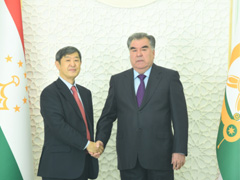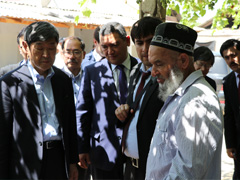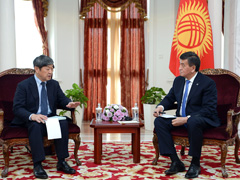JICA President Shinichi Kitaoka paid the first visit by a JICA president to the Republic of Tajikistan and the Kyrgyz Republic from June 23 to 30. He held talks with government dignitaries from the two countries and visited the sites of ODA projects.
He first visited Tajikistan, a country which has a geopolitically important location that is a nodal point of Asia, Europe, Russia and the Middle East. After Tajikistan achieved independence from the former Soviet Union, it experienced a civil war that continued until 1997, but it subsequently recovered its public security and social stability and is steadily advancing from recovery to economic growth. (July marks 20 years since the murder of four members of the United Nations Mission of Observers in Tajikistan, including Yutaka Akino, amid an unstable security situation that immediately followed the end of the war.) On the other hand, one of the poorest of the former Soviet republics, it is considered important for Tajikistan to improve the deteriorating social infrastructure that remains from the Soviet era and to create a business environment that cultivates domestic industry and promotes employment.

Tajikistani President Emomali Rahmon, right, and JICA President Shinichi Kitaoka hold talks
After Mr. Kitaoka met with Prime Minister Kokhir Rasulzoda, he attended the hand-over ceremony for the grant aid project “the Project for Improvement of Dushanbe International Airport,” and then, Mr. Kitaoka visited the Sughd Region in the north. He was invited as a guest to a commemorative ceremony for National Unity and Reconciliation Day, which commemorates the signing of the peace agreement after the end of the civil war, and met with President Emomali Rahmon. Various dignitaries expressed appreciation for Japan's cooperation in various fields including infrastructure development for recovery from the civil war and human resource training to build up the country, and they said they looked forward to continuing assistance. Mr. Kitaoka talked about the importance of human resource development and said JICA will continue cooperation for sustainable development through the development of socioeconomic infrastructure, and consider cooperation for the private sector that would lead to tourism development and job creation.
Mr. Kitaoka welcomed improved relations between Uzbekistan and Tajikistan and said JICA will continue promoting practical cooperation that leads to partnerships within the region of Central Asia.
The following day, June 26, Mr. Kitaoka visited the Khatlon Region in the south and observed a water supply system in Panj District that was built with grant aid and won a 2017 JICA President's Award for being a good example of a water supply management system. He then visited an international trunk road between Bokhtar City or formerly Qurghonteppa City and Dusti that links Tajikistan's capital, Dushanbe, with Afghanistan, north to south. Through these visits, he confirmed that the infrastructure for logistics and access to safe water for residents are improving.
Mr. Kitaoka also visited a site of the Project for Livelihood Improvement in Tajik-Afghan Cross-Border Areas (LITACA), which assists with employment training and livelihood improvement for women in the border region spanning Tajikistan and Afghanistan in partnership with the United Nations Development Programme. There, he encouraged women participating in training.

JICA President Shinichi Kitaoka listens to people who live near the Panj District water supply project as they tell their stories
The next country Mr. Kitaoka visited was Kyrgyz Republic. Like Tajikistan, it is one of the least developed countries of the former Soviet republics. However, democratization and economic liberalization are proceeding quickly there, and the country joined the Eurasian Economic Union an economic union made up of Armenia, Belarus, Kazakhstan, Kyrgyzs and Russia, in 2015. Like with Tajikistan, JICA is mainly cooperating in the areas of industrial diversification, encouraging agriculture and business to address issues such as job creation and the deterioration of social infrastructure, and creating transportation infrastructure.
On June 28, Mr. Kitaoka visited the Issyk-Kul Region in the eastern part of the country and checked on the situation of the One Village One Product (OVOP) project being carried out there that relates to promoting the employment of women, and had a friendly conversation with the women producing products under the OVOP brand. He confirmed that it is an important project that contributes to the financial independence of the women producers, including changing the way they think. The producers are using the income they earn for their children's education and to purchase their own clothes, among other things. Mr. Kitaoka also visited the UNESCO World Heritage Suyab Ruins in Ak-Beshim Village and discussed tourism development there with Kyrgyz government personnel. He confirmed that the site has great potential as part of a tourist route that also includes nearby ruins.
On the next day, June 29, in the capital Bishkek, Mr. Kitaoka attended a signing ceremony for a grant agreement for The Project for Human Resource Development Scholarship(JDS) and a hand-over ceremony for the grant aid project The Project for Improvement of Equipment of the Manas International Airport. He also met with President Sooronbai Zheenbekov and Prime Minister Mukhammetkalyi Abylgaziyev. Mr. Kitaoka said JICA will continue its cooperation to contribute to local development, cultivating private industry and human resource development while considering cooperation in the health sector to correct disparities that accompany economic growth. On the topic of human resource development, Mr. Kitaoka also introduced the new JICA Program with Universities for Development Studies concept. Various dignitaries thanked Mr. Kitaoka for JICA's high-quality cooperation immediately after the country's independence in human resource development in particular, and said they look forward to enhanced assistance for Kyrgyz Republic. The same day, Mr. Kitaoka talked informally with students who had studied in Japan under JDS and now work in pivotal roles in the Kyrgyz government. He commented that the JDS project in Kyrgyzs Republic is one of the best examples in the world, and he praised the excellent work of the former students.

JICA President Shinichi Kitaoka, left, meets with Kyrgyz President Sooronbai Zheenbekov
The two countries are exceedingly important for the stability and connectivity of the Central Asia region. Building on this visit, JICA will redouble its efforts to increase the stability of Tajikistan and Kyrgyzstan and to strengthen its relationships with them.




scroll